Green Party leader Roderic O'Gorman told reporters at his party's general election manifesto that "words cost nothing, it's action that counts".
So, given it is a document with lots of words, what are the key actions the Green Party believe it will all result in?
Transport:
- €10 billion plan to "super charge" transport in Ireland, funded by €7bn of Apple tax money and €3bn from other sources.
- Funding for Bus Connects and the start of construction on the Dublin Metrolink, Dart+, the Luas extension.
- Funding for a new light rail line from Mahon to Ballincollig in Cork, as well as the re-opening of the railway line from Wexford to Waterford and upgrading of existing rail lines in Limerick and Kilkenny.
- A promise to "explore" the possibility of a light rail system in Galway.
- Cuts to public transport ticket prices, including a 20% cut for adult fares, a 60% cut for young people fares and free fares for children aged under nine.
- A "climate ticket" for public transport to replace the "tax saver ticket".
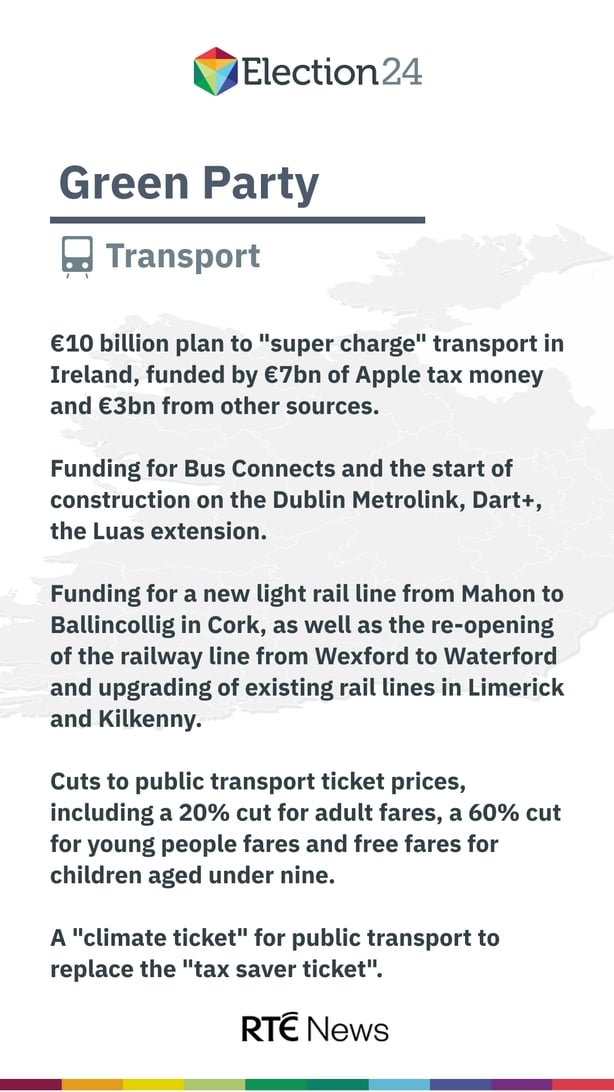
Climate action and nature:
- A €1.2bn public buildings retro-fitting fund.
- €200 million for "energy efficiency measures" for businesses, €300m to support a new biomethane industry, and a €200m fund to research new clean technologies.
- €100m to invest in offshore wind and "micro-generation" (small scale energy from renewable sources] infrastructure.
- The development of a nature restoration plan and to advocate for an EU nature restoration fund.
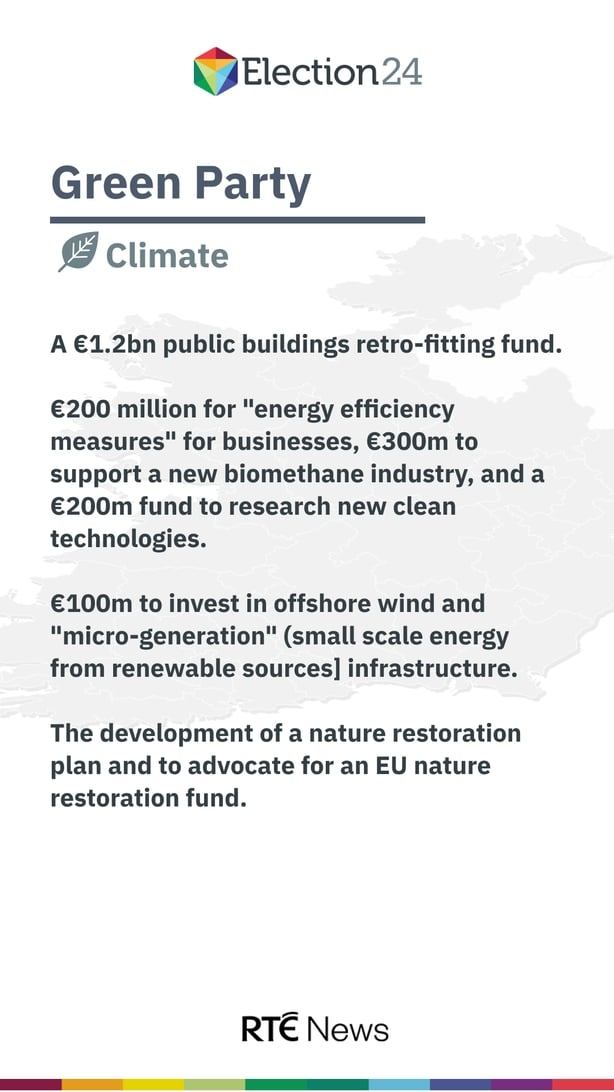
Housing:
- Build 50-53,000 new homes a year. This promise includes the building of 15,000 affordable homes and 12,000 social homes.
- The new homes target also includes the renovation of "at least" 4,000 vacant or derelict buildings.
- A new Minister of State for Regional cities to "ensure public capital investment goes to Waterford, Limerick, Cork and Galway".
- Make the Help-to-Buy scheme available to renters who want to purchase their home from their landlord.
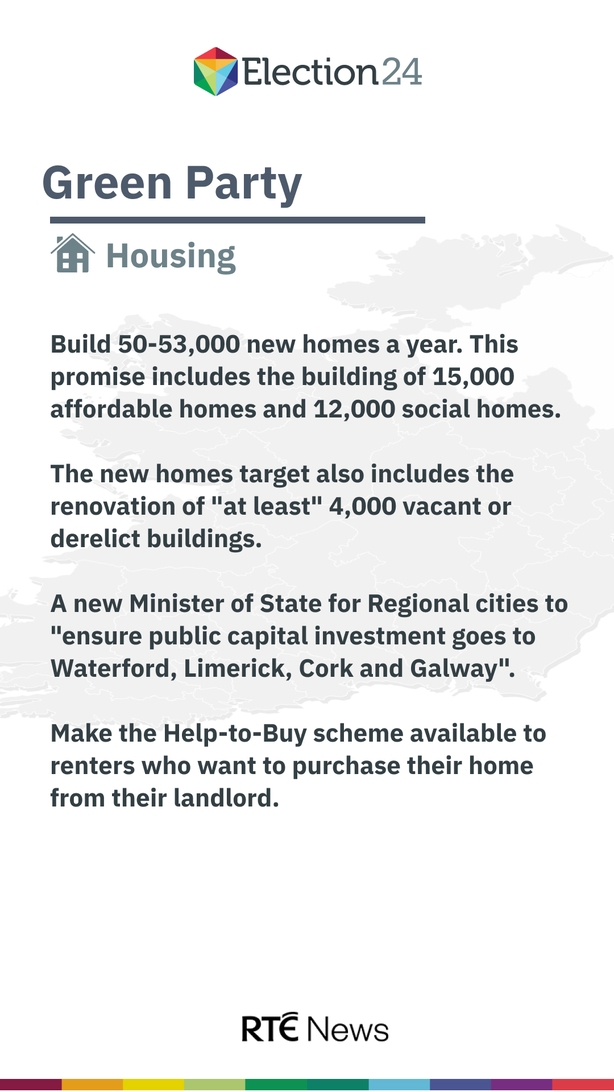
The economy:
- The introduction of a rates rebate for businesses.
- The expansion of the energy efficiency grant.
- Establish what the party describes as an "IDA Ireland for skills to help people find a job in Ireland" - this will include a focus on public service roles and re-location cost support.
- Use some of the proposed €3bn climate and nature fund to help businesses switch from fossil fuel use to heat pumps and zero emissions gas.
- A Citizen's Assembly to examine the introduction of a four-day working week.
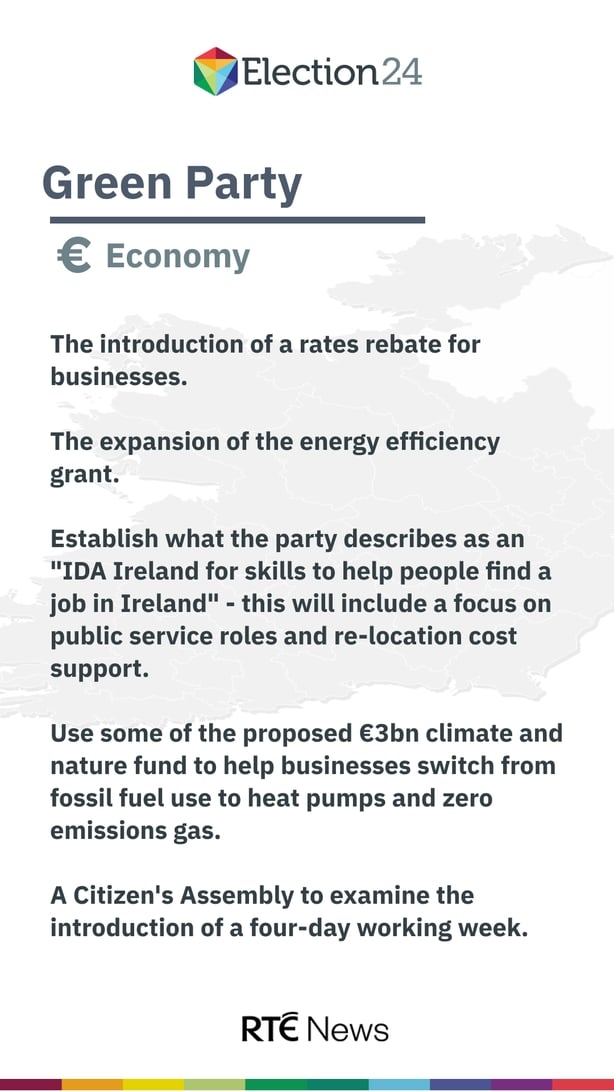
Welfare:
- Establish a new Means Testing Agency to allow for a "better targeting of grants and social assistance payments".
- Increase social welfare in line with wage and price inflation.
- Introduce a new anti-child-poverty payment.
- Increase home carer's tax credit to €4,000 and make it available to unmarried co-habiting parents.
- Introduce a new €50 weekly cost of disability payment.
- Extend maternity, paternity and parents leaves to provide 52 weeks leave in the first year of a child's life and increase maternity, paternity and parent's benefit by €40 per week.
Health:
- Expand GP visit card to children aged eight to ten.
- Enhance access to abortion care and remove the obligatory three-day waiting period.
- "Review" the Disability Act 2005 in order to examine if the assessment of need process can be streamlined.
- Establish a digital prescriptions system.
- Legislate for paid leave for pregnancy loss in all its forms for up to 20 days.
- Introduce free bi-annual gynaecological appointments for women aged 16-40.
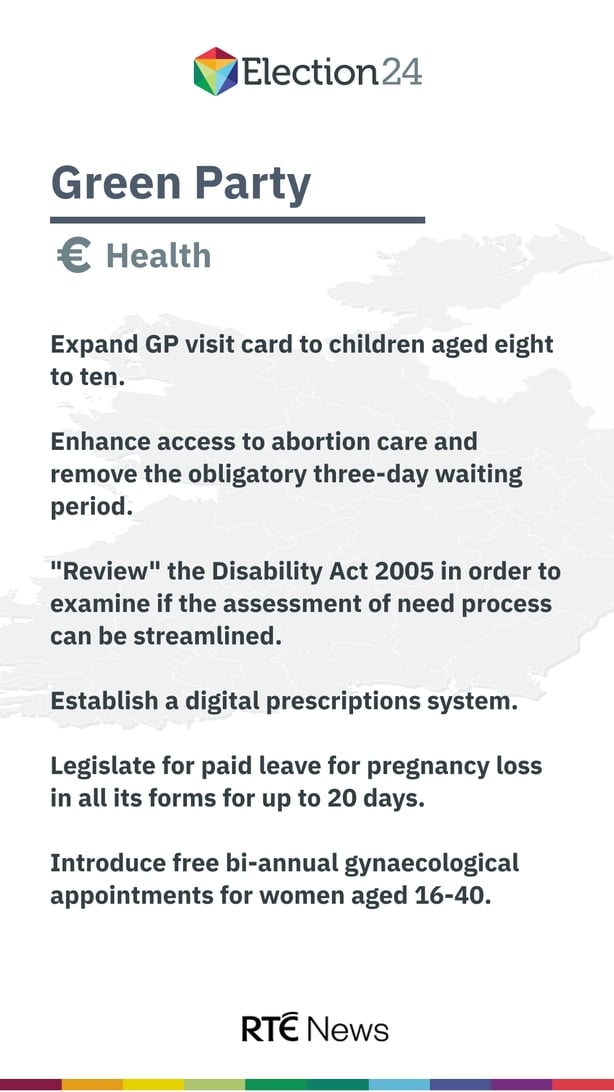
Education:
- "Examine the possibility" of a new university that teaches classes online.
- Provide financial support to higher education institutions so they can build student accommodation.
- Expand third level campus health services, including sexual health care.
- Increase apprenticeships, especially in construction, the digital economy and the green economy.
Childcare:
- Place on a statutory footing the right for each child to be able to receive two years of early years education.
- Increase pay and working conditions for early years professionals.
- Introduce a new single national fee structure for public and private providers.
- Financial assistance to parents to "ensure" free access to early years education for children of families on lower incomes, and for no family to be charged more than €200 per child per month.
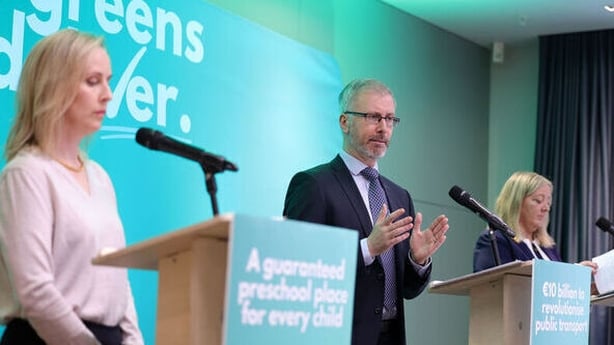
Immigration:
- Establish a new Asylum and Integration Agency to oversee asylum requests, accommodation and integration supports.
- Implement a Comprehensive Accommodation Strategy to support communities to welcome people seeking asylum.
Farming:
- Double the area of agricultural land being farmed organically to 10% by 2030.
- End live animal exports to non-EU countries for fattening and slaughter.
- End fox hunting and ban hare coursing.
Safety and gardaí:
- Increase the number of gardaí to 15,000.
- The establishment of a "multi-pronged approach" to end violence against women and girls, focusing on education, domestic violence, coercive control and the need for refuge spaces.
Arts and culture:
- Expand the basic income for the arts pilot programme.
- Establish a new arts capital and equipment programme.
- Allow longer opening hours and change event licensing rules to help the night-time economy.
Foreign affairs:
- "Immediately" enact the Occupied Territories Bill.
- Suspend dual use export licences to Israel.
- Continue to provide non-lethal military aid to Ukraine, including de-mining and cyber defence.
Politics:
- Lower the voting age to 16.
- Expand the 40% female candidate gender quota to include cabinet appointments and Oireachtas committee chairs.
- Limit political posters to specific areas of towns and villages to help cut down on waste.
We need your consent to load this rte-player contentWe use rte-player to manage extra content that can set cookies on your device and collect data about your activity. Please review their details and accept them to load the content.Manage Preferences







